The making of a man: Trent Alexander-Arnold's journey from Crosby to Kiev
From day one, Alexander-Arnold's life has been geared to all things red. Indeed, the youngster seems to already know where his future lies
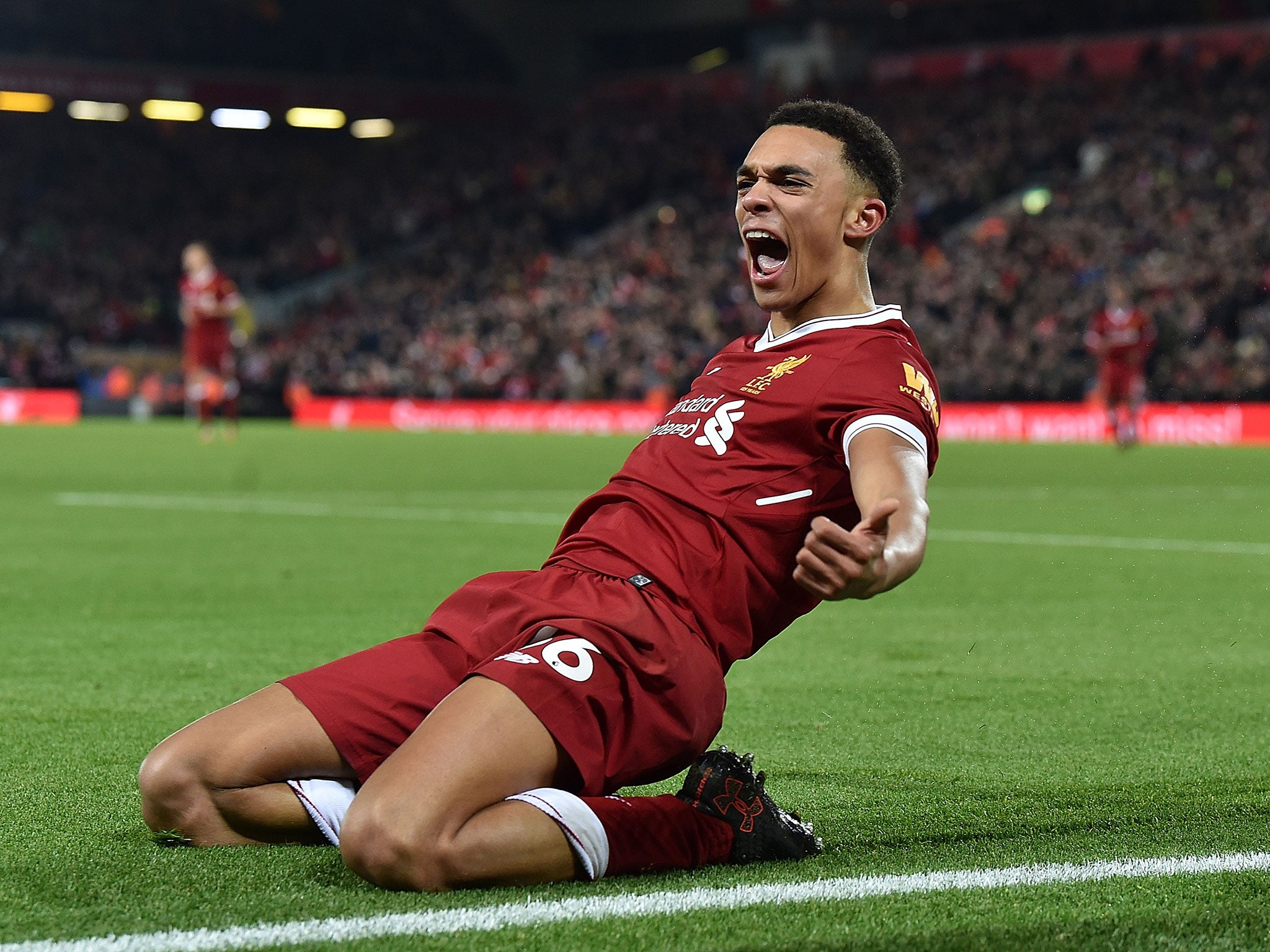
Your support helps us to tell the story
From reproductive rights to climate change to Big Tech, The Independent is on the ground when the story is developing. Whether it's investigating the financials of Elon Musk's pro-Trump PAC or producing our latest documentary, 'The A Word', which shines a light on the American women fighting for reproductive rights, we know how important it is to parse out the facts from the messaging.
At such a critical moment in US history, we need reporters on the ground. Your donation allows us to keep sending journalists to speak to both sides of the story.
The Independent is trusted by Americans across the entire political spectrum. And unlike many other quality news outlets, we choose not to lock Americans out of our reporting and analysis with paywalls. We believe quality journalism should be available to everyone, paid for by those who can afford it.
Your support makes all the difference.Trent Alexander-Arnold was playing rugby. This was in a different life, some distance from Anfield – even further from Kiev. This was on a muddy field, where the green hills run down to the North Walian coastline. His physical education teacher at St Mary’s in Crosby can remember one of his first games. “He was a centre forward for the football team and a full-back in rugby,” recalls Derek Williams. “He scored lots of goals and lots of tries.” One of those tries came against Rydal in Colwyn Bay.
A footballer first, he gave rugby a go because some of his talents were transferable. Initially, he was unsure of his responsibilities. “I told him full-back in rugby was like being a sweeper in football: ‘Stay in line with the ball and when you catch it, run with it and put it down behind those posts down there.’ That’s exactly what he did,” says Williams. “The first time he got the ball, he ran the full 80 metres. I was shouting, ‘Put it down!’ He then took the kick as well… he was that sort of lad.”
Jan van Deventer, a South African working as a coach at Waterloo, whose ground is in Blundellsands, the area in Sefton next to Crosby, was present that day, helping his friend. He turned to Williams instantly, saying: “Derek, that boy can run, mate…”
And so, this was one of Alexander-Arnold’s first experiences of playing as a full-back. On Saturday night, he will operate the same position – only this time as a nineteen-year-old in the Champions League final. The opponent will not be a thunder-thighed Welsh fledgling but, instead, Cristiano Ronaldo.
Alexander-Arnold would leave St Mary’s aged 14 at the insistence of the decision makers at Liverpool’s academy. The club has a link with another school in Rainhill, which allows intake to balance football with education. Trent’s older brother Tyler is 23. His younger brother, Marcel, is 16. Each have attended St Mary’s, which is a fee-paying school.
“A footballer from a fee-paying school?” the armchair cynics might scoff – thinking this is another droid out of touch with reality. Yet it is a mark of Alexander-Arnold’s memory and generosity that he did not forget the key role played by early influences like Williams, who will be in Kiev as a guest of the family and his sponsor, Under Armour. You learn more about Alexander-Arnold’s personality when you find out he went back to St. Mary’s – as well as Rainhill – to help out with assemblies and hand out awards, but not because Liverpool suggested it was a good idea. He was not chaperoned. He went by himself simply because he thought it was the right thing to do.
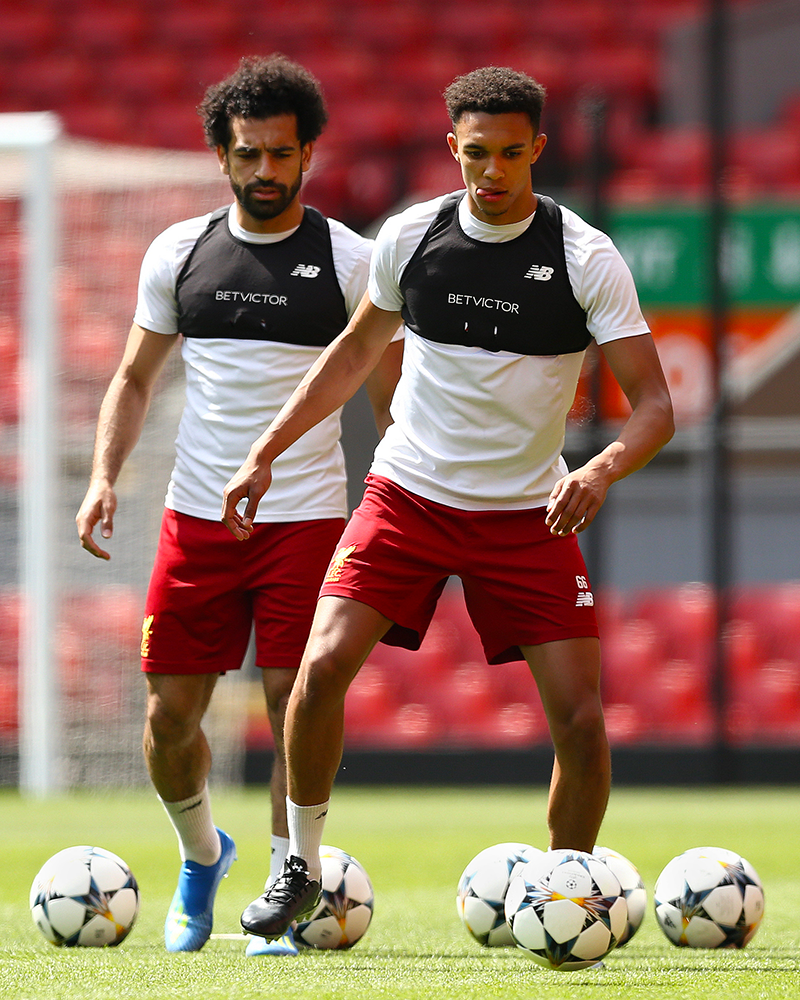
The former student is described by teachers as, “A very determined young sportsman.” Williams has taught 17 professionals during his time at St Mary’s, including Carl Fearns, the back-row forward currently contracted to Lyon in France, and Gavin Griffiths, the pace bowler who moved from Lancashire to Leicestershire last summer. Morgan Feeney, the Bootle-born centre back who made his debut for Everton last season, is also on the list – and he’d been in the same year as Alexander-Arnold.
“Unbelievable focus, all of them,” Williams says. “Trent was a quiet lad. A tremendous athlete, gets stuck in – another Steven Gerrard. He’s got a thick skin, really resilient. Every time he’s faced a hurdle, he’s found a way to overcome it. He’s not a big mouth. He still lives at home with his mum, Diane, and she has her three boys really well balanced. A lovely family. But so, so determined as well.”
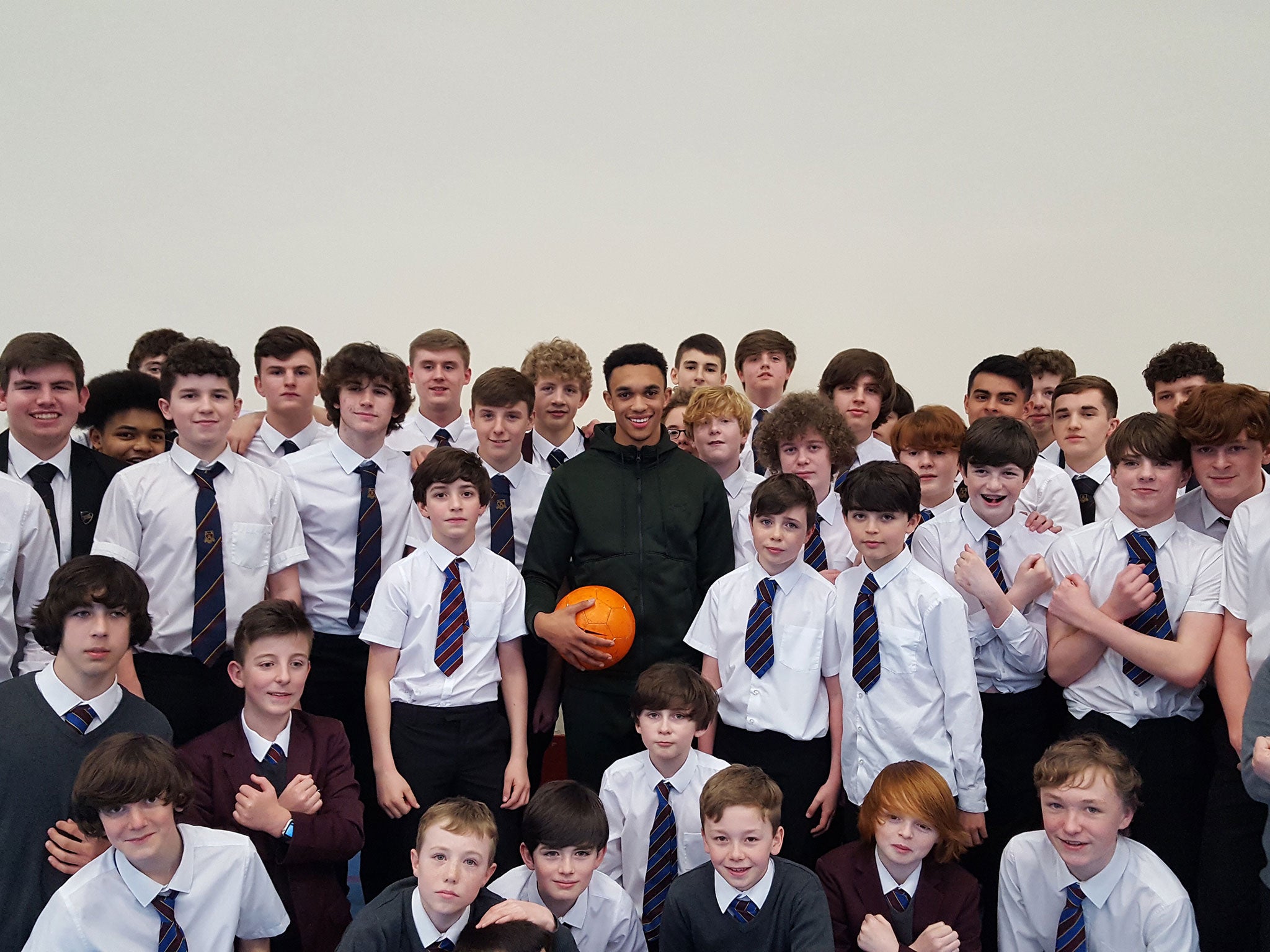
There is another story which reflects this determination, back when he was aged six or seven – long before St Mary’s. This was a footballer so talented that when Liverpool spotted him, and realising they could not sign him for another year, they pretty much hid him at a Sunday league team with trusted links to the club so he could still play but send the vultures away.
The team was called Country Park and they had established the sort of lead they tended to establish whenever Alexander-Arnold played, at which point he’d drop in at centre half to secure the result. It was 4-0 when Country Park won a corner. Alexander-Arnold was desperate to take it, only a warning came his way. “If we end up conceding from here, it’s your fault.”
The corner was cleared and from there, the opposition forward chased after the ball, forcing Alexander-Arnold to sprint back as fast as he could. The forward was free: he was away, it would become 4-1 surely. That chance of that happening ended when Alexander-Arnold stretched out his leg as far as he could and deliberately tripped the forward up. “He knew what he had to do to win from an early age,” was the observation that day. “A Scouse trait.”
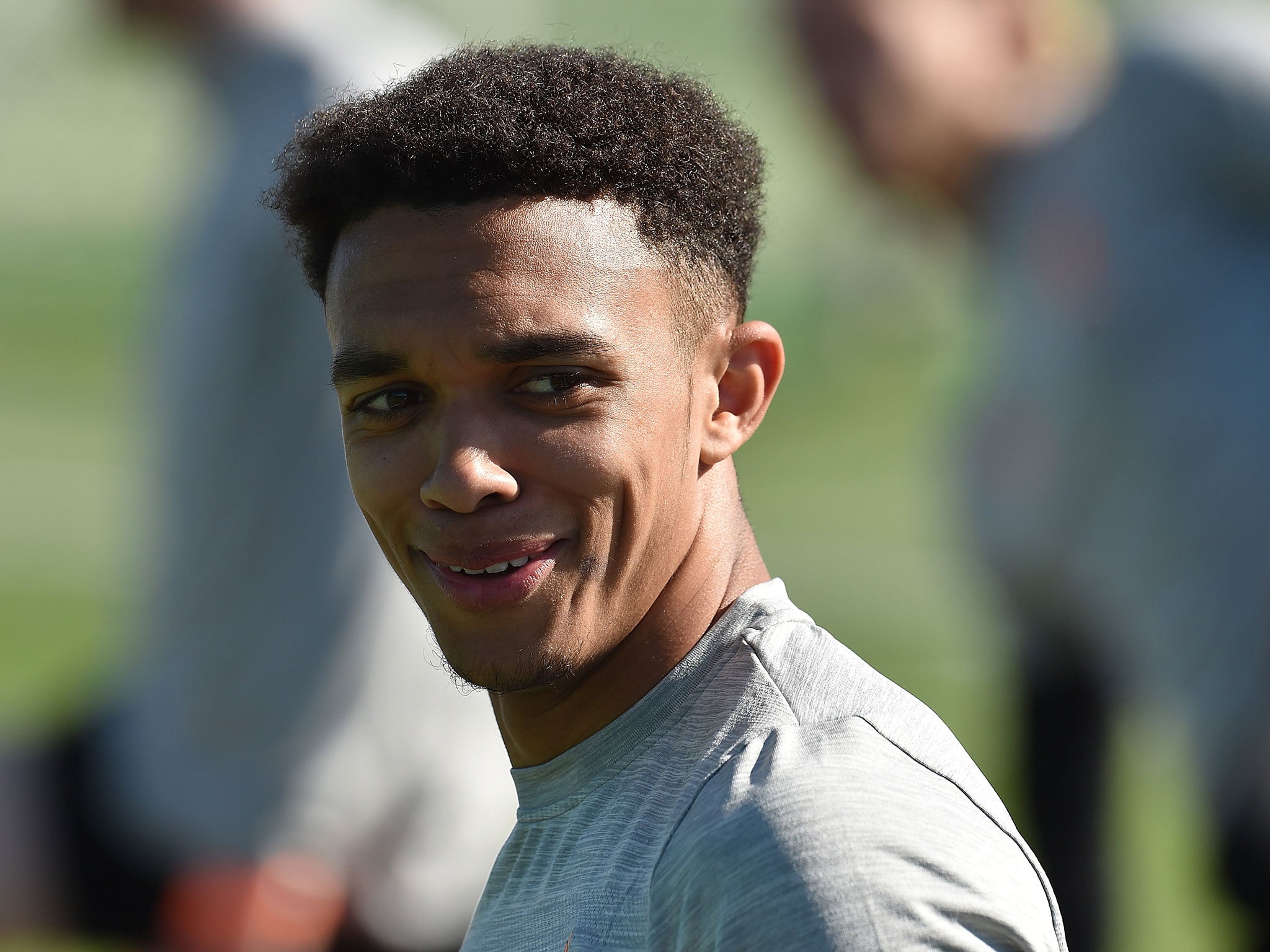
Scouts from Manchester United and Everton would watch Country Park. But Alexander-Arnold was a Liverpool supporter, he lived in West Derby – just around the corner from the training ground. He knew where he wanted to be. He was wiry and fast. More athletic than Jon Flanagan – another Country Park player. More mobile than Andre Wisdom. More technically gifted than Jordan Rossiter. Smarter than Brad Smith. After five minutes of trials at Ellegreen school, industrial language was used. “Who the f**k is this?” There was a real sense of excitement amongst those watching from Liverpool. “This kid is unbelievable; touch and control as well…the best I’d seen.”
Diane, his mum, remains an enormous influence. Alexander-Arnold was a quiet kid and incredibly modest considering his talents, though he would react badly to defeat. It became a regular routine of Diane’s, to call the organisers at Liverpool and announce, “He’s not playing next week…he hasn’t eaten his dinner.” The message was loud, clear and deliberate. The next day, another call would follow. “Ok, maybe he can play next weekend…but only if he continues to behave…”
Liverpool became accustomed to the ruse and would play along. Those who still operate inside the academy believe it is the presence of Diane in his life that explains his discipline and focus. His love for the game has been allowed to lead him. Everton’s Antonee Robinson, who spent last season on loan at Bolton Wanderers, was a year older than Alexander-Arnold but because of Alexander-Arnold’s ability, he always trained at least one year above his natural age group. Ten summers ago, the pair were in the same team but Robinson decided to leave when Everton made his family a lucrative offer. Similar offers from elsewhere were made to Diane but they were not entertained. “He’s not motivated by money at all,” says someone who knows his family well. “All he cares about is football and Liverpool. He’s obsessed.”

Alexander-Arnold was in the same league as Raheem Sterling and Ben Woodburn when it came to notoriety inside Liverpool’s academy. Each player was capable of mistakes but they would learn from those mistakes. If they were told something, they would only need to be told once, whether a positive or negative.
Alexander-Arnold has never given much away in terms of emotion. He is more of an introvert. When he trained for the first time with Liverpool’s first team, he trained well but for weeks he kept himself to himself. Jürgen Klopp wanted him to engage more, to bring the confidence out of him. The advice from those that had worked with him previously was to offer him lots of feedback. He craved information – though not necessarily to know that he was performing to expected standard. He wanted to learn.
On that basis, Klopp made a point of sitting down with him regularly, going through his expectations: outlining his beliefs and speaking to him about football. Klopp is traditional in that sense. Academy players are used to coaches explaining everything. In training sessions, Klopp outlines the drill, watches, and repeats until they get it right. The aim is for actions to become natural. He only intervenes if there is a collective problem rather than an individual. He believes it is for the individual to figure out situations. Once training sessions are completed, this is when he becomes more paternalistic. On that basis, the relationship between Alexander-Arnold and Klopp bloomed.
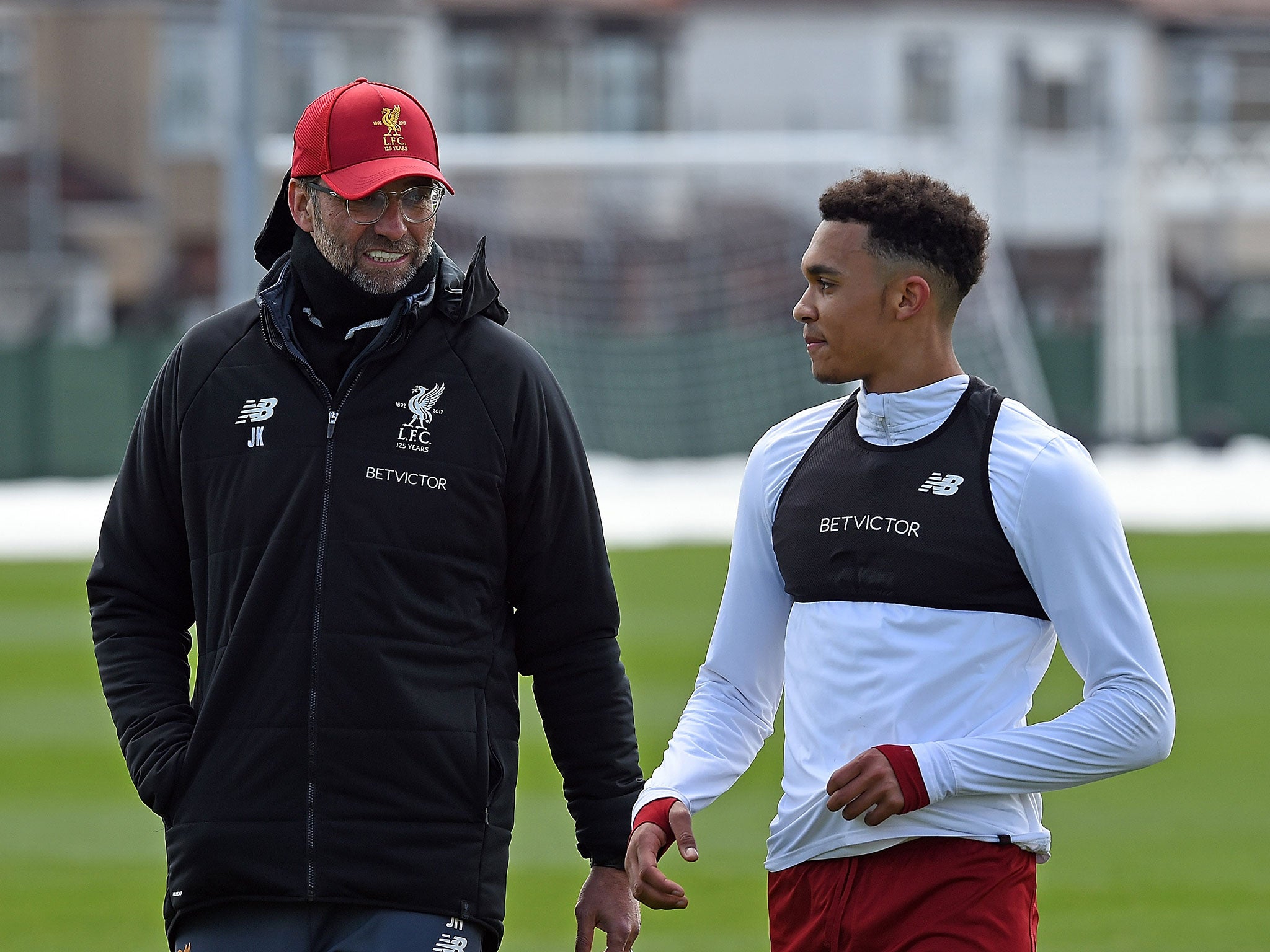
To leave the Anfield’s changing rooms, each player passes through a mixed zone where journalists wait with their notepads and their Dictaphones. Liverpool’s players are generally fair with their time. Klopp likes them talking to the media because he believes it helps them take responsibility, taking account for what they say.
In an industry where many Alexander-Arnold’s age would prefer to shuffle past wearing their headphones, he stops even in defeat. He is challenging himself, he is not looking for someone to help him out. He is impressive. His approach and manner reminds of a more open time, like it was at Melwood all those years ago when players and journalists would digress in the car park after training sessions.
On Monday afternoon, Dejan Lovren joked that Alexander-Arnold looks like a 14-year-old but acts like someone who’s a lot older than his real age. It is his sense of purpose that impresses most. He seems to already know where his future lies. From here, it feels like it would be a major surprise if he does not end up captaining Liverpool.
Join our commenting forum
Join thought-provoking conversations, follow other Independent readers and see their replies
Comments